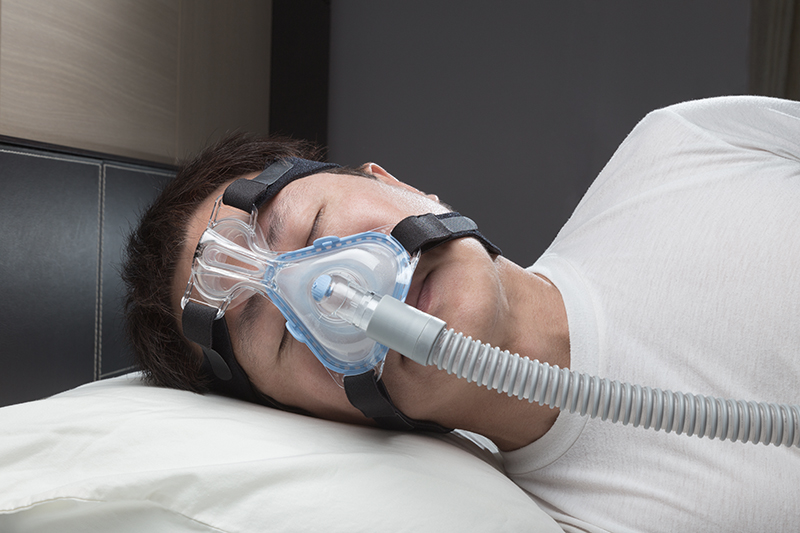Everyone knows that “sleep” is the best form of rest, as it helps recharge the energy and balance the body functions, contributing to good health. However, what many may not know is that sometimes abnormal sleeping behaviors, unbeknownst to us, may cause health problems to both you and those close to you.
Currently, the numbers of cases regarding insomnia, snoring, abnormal breathing during sleep, and unexplained daytime sleepiness, find that up to 400-500 patients seek medical advice per year. A critical issue is that symptoms such as snoring, not sleeping well or restfully, especially in men, cannot be easily overlooked as they may pose a significant risk of serious illnesses. The situation might not be as dire as dying in one’s sleep, but it can affect the cardiovascular system, leading to an enlarged heart and high blood pressure. For example, if the patient has diabetes, it can make diabetes control more challenging, increasing the risk of a fatal arrhythmia.
The cause is often due to the muscles in the neck along the windpipe becoming slack with age, usually starting around the age of 30, with men being more affected than women. Weight-related factors also play a role, as those who gain weight quickly or are obese are at a higher risk. Another factor is genetics, presenting issues from a young age with muscle slackness.
Facial structure also plays a part. Asians, especially those with short necks and flat faces, have a narrower upper airway, making them more susceptible to these issues. Coupled with decreased physical activity, the aforementioned muscles become even slacker during deep sleep. When the individual enters deep sleep, and the muscles slack, the windpipe collapses, leading to insufficient oxygen supply to the brain, causing the brain to trigger wakefulness. Patients experiencing these symptoms tend to fall asleep and wake up frequently, known as not getting enough sleep.
Snoring and not getting enough restful sleep
Not everyone who snores has sleep apnea, but people who snore are more likely to not get enough restful sleep compared to those who don’t. Those who snore should observe if they stop breathing during sleep. Some might just have upper airway resistance syndrome, like those with allergies, sinus issues, or enlarged tonsils, meaning they snore but do not stop breathing.
Important warning signs that require medical consultation include snoring loud enough to disturb others. Often, the patient is unaware until someone close to them points it out. Another sign is waking up feeling unrested despite spending 6-8 hours asleep, feeling groggy in the afternoon, especially after lunch, feeling sleepy while driving alone, or during meetings.
If you have problems sleeping, it is best to consult a doctor for a precise diagnosis, usually through a sleep study because a consultation can only gather history and gauge the likelihood of a disorder. For a 100% diagnostic accuracy, a sleep lab visit is required where patients spend the night at the hospital equipped with monitoring devices to check for snoring, oxygen desaturation, and other issues.

Men are at greater risk than women
Men over the age of 30 are at a higher risk. If you have sleeping problems, it is advisable to check the severity of the disorder. Some cases are mild and don’t require daily use of a device to help widen the airway during sleep, which helps solve the problem but is only used for severe cases.
The Sleep Lab at Bangkok International Hospital is equipped to evaluate patients with sleep disorders such as snoring and sleep apnea, excessive daytime sleepiness, epilepsy; as such conditions have been on the rise, affecting brain function and leading to continuous sleep issues in both daytime and nighttime, excessively sleeping for 3-4 days, impacting their life by not feeling refreshed due to inadequate rest, possibly leading to accidents. Other symptoms may include reduced cognitive efficiency and memory loss.
Sleep Lab exams include EEG, EMG, EOG, ECG, oxygen saturation, mouth and nose breathing measurements, combined with the functionality of chest and abdominal muscles used in breathing, accommodating both children and adults. Identifying abnormalities is crucial for effective treatment planning, especially in those with significant breath-stopping episodes, where using a CPAP machine to keep the airway open, reducing sleep apnea, and snoring symptoms, may be necessary.
Sleep is the best form of rest, but it has to be quality sleep, otherwise, it’s a “risk”.
